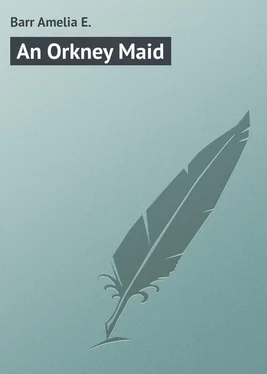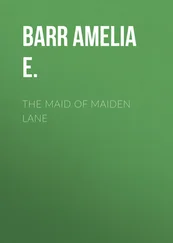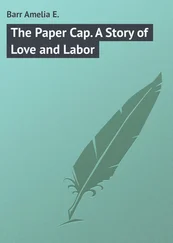Amelia Barr - An Orkney Maid
Здесь есть возможность читать онлайн «Amelia Barr - An Orkney Maid» — ознакомительный отрывок электронной книги совершенно бесплатно, а после прочтения отрывка купить полную версию. В некоторых случаях можно слушать аудио, скачать через торрент в формате fb2 и присутствует краткое содержание. Жанр: foreign_prose, на английском языке. Описание произведения, (предисловие) а так же отзывы посетителей доступны на портале библиотеки ЛибКат.
- Название:An Orkney Maid
- Автор:
- Жанр:
- Год:неизвестен
- ISBN:нет данных
- Рейтинг книги:5 / 5. Голосов: 1
-
Избранное:Добавить в избранное
- Отзывы:
-
Ваша оценка:
- 100
- 1
- 2
- 3
- 4
- 5
An Orkney Maid: краткое содержание, описание и аннотация
Предлагаем к чтению аннотацию, описание, краткое содержание или предисловие (зависит от того, что написал сам автор книги «An Orkney Maid»). Если вы не нашли необходимую информацию о книге — напишите в комментариях, мы постараемся отыскать её.
An Orkney Maid — читать онлайн ознакомительный отрывок
Ниже представлен текст книги, разбитый по страницам. Система сохранения места последней прочитанной страницы, позволяет с удобством читать онлайн бесплатно книгу «An Orkney Maid», без необходимости каждый раз заново искать на чём Вы остановились. Поставьте закладку, и сможете в любой момент перейти на страницу, на которой закончили чтение.
Интервал:
Закладка:
“Then the Bishop thought your niece would be more reverent?”
“He knew she would. He knew also, that she would not be afraid to be in the cathedral by herself, she would do the work with her own hands, and that there would be no giggling and gossiping and no young lads needed to hold vases and scissors and little balls of twine.”
Their “moderate bite” was a pleasant lingering one. They talked of people in Edinburgh with whom they had some kind of a mutual acquaintance, and Mistress Brodie did the most of the talking. She was a charming story-teller, and she knew all the good stories about the University and its great professors. This day she spent the time illustrating John Stuart Blackie taking his ease in a dressing gown and an old straw hat. She made you see the man, and Ian felt refreshed and cheered by the mental vision. As for Lord Roseberry, he really sat at their “modest bite” with them. “You know, laddie,” she said, “Scotsmen take their politics as if they were the Highland fling; and Roseberry was Scotland’s idol. He was an orator who carried every soul with him, whether they wanted to go or not; and I was told by J. M. Barrie, that once when he had fired an audience to the delirium point, an old man in the hall shouted out:–‘I dinna hear a word; but it’s grand; it’s grand!’”
They barely touched on Scottish religion. Mistress Brodie easily saw it was a subject her guest did not wish to discuss, and she shut it off from conversation, with the finality of her remark that “some people never understood Scotch religion, except as outsiders misunderstood it. Well, Ian, I will be ready for our visit in about two hours; one hour to rest after eating and a whole hour to dress myself and lecture the lasses anent behaving themselves when they are left to their own idle wishes and wasteful work.”
“Then in two hours I will be ready to accompany you; and in the meantime I will walk over the moor and smoke a cigar.”
“No, no, better go down to the beach and watch the puffins flying over the sea, and the terns fishing about the low lying land. Or you might get a sight of an Arctic skua going north, or a black guillemot with a fish in its mouth flying fast to feed its young. The seaside is the place, laddie! There is something going on there constantly.”
So Ian went to the seaside and found plenty of amusement there in watching a family quarrel among the eider ducks, who were feeding on the young mussels attached to the rocks which a low tide had uncovered.
It was a pleasant walk to the Ragnor home, and Rahal and Thora were expecting them. The sitting room was cheery with sunshine and fire glow, Rahal was in afternoon dress and Thora was sitting near the window spinning on the little wheel the marvellously fine threads of wool made from the dwarfish breed of Shetland sheep, and used generally for the knitting of those delicate shawls which rivalled the finest linen laces. On the entrance of her aunt and Ian Macrae she rose and stood by her wheel, until the effusive greetings of the two elder ladies were complete; and Ian was utterly charmed with the picture she made–it was completely different from anything he had ever seen or dreamed about.
The wheel was a pretty one, and was inlaid with some bright metal, and when Thora rose from her chair she was still holding a handful of fine snowy wool. Her blue-robed and blue-eyed loveliness appeared to fill the room as she stood erect and smiling, watching her mother and aunt. But when her aunt stepped forward to introduce Ian to her, she turned the full light of her lovely countenance upon him. Then both wondered where they had met before. Was it in dreams only?
Mother and aunt were soon deep in the fascinating gossip of an Edinburgh winter season, and Thora and Ian went into the greenhouse and the garden and found plenty to talk about until Conall Ragnor came home from business and supper was served. And the wonder was, that Conall bent to the young man’s charm as readily as Thora had done. He was amazed at his shrewd knowledge of business methods and opportunities; and listened to him with grave attention, though laughing heartily at some of his plans and propositions.
“Mr. Macrae,” he said, “thou art too far north for me. I do know a few Shetlanders that could pare the skin off thy teeth, but we Orcadeans are simple honest folk that just live, and let live.” At which remark Ian laughed, and reminded Conall Ragnor of certain transactions in railway stock which had nonplussed the Perth directors at the time. Then Ragnor asked how he happened to know what was generally considered “private information,” and Ian answered, “Private information is the most valuable, sir. It is what I look for.” Then Ragnor rose from the table and said, “Let us have a smoke and a little music.”
“Take thy smoke, Coll,” said Mrs. Ragnor, “and Mr. Macrae will give us the music. Barbara says he sings better than Harrison. Come, Mr. Macrae, we are waiting to hear thee.”
Ian made no excuses. He sat down and sang with delightful charm and spirit “A Life on the Ocean Wave” and “The Bay of Biscay.” Then these were followed by the fresh and then popular songs, “We May Be Happy Yet,” “Then You’ll Remember Me” and “The Land of Our Birth.” No one spoke or interrupted him, even to praise; but he was well repaid by the look on every face and the kindness that flowed out to him. He could see it in the eyes, and hear it in the voices, and feel it in the manner of all present.
The silence was broken by the sound of quick, firm footsteps. Ragnor listened a moment and then went with alacrity to open the door. “I knew it was thee!” he cried. “O sir, I am glad to see thee! Come in, come in! None can be more welcome!” And it was good to hear the strong, sweet modulations of the voice that answered him.
“It is Bishop Hedley!” said Rahal.
“Then I am going,” said Aunt Barbara.
“No, no, Aunt!” cried Thora, and the next moment she was at her aunt’s side coaxing her to resume her chair. Then the Bishop and Ragnor entered the room, and the moment the Bishop’s face shone upon them, all talk about leaving the room ceased. For Bishop Hedley carried his Great Commission in his face and his life was a living sermon. His soul loved all mankind; and he had with it an heroic mind and a strong-sinewed body, which refused to recognise the fact that it died daily. For the Bishop’s business was with the souls of men, and he lived and moved and did his daily work in a spiritual and eternal element.
And if constant commerce with the physical world weakens and ages the man who lives and works in it, surely the life passed amid spiritual thoughts and desires is thereby fortified and strengthened to resist the cares and worries which fret the physical body to decay. Then vainly the flesh fades, the soul makes all things new. This is a great truth–“it is only by the supernatural we are strong.”
The Bishop came in bringing with him, not only the moral tonic of his presence, but also the very breath of the sea; its refreshing “tang,” and good salt flavour. His smile and blessing was a spiritual sunshine that warmed and cheered and brightened the room. He was affectionate to all, but to Mistress Brodie and Ian Macrae, he was even more kindly than to the Ragnors. They were not of his flock but he longed to take care of them.
“I heard singing as I came through the garden,” he said, “and it was not your voice, Conall.”
“It was Ian Macrae singing,” Conall answered, “and he will gladly sing for thee, sir.” This promise Macrae ratified at once, and that with such power and sweetness that every one was amazed and the Bishop requested him to sing, during the next day’s service, a fine “Gloria” he had just given them in the cathedral choir. And Ian said he would see the organist, and if it could be done, he would be delighted to obey his request.
Читать дальшеИнтервал:
Закладка:
Похожие книги на «An Orkney Maid»
Представляем Вашему вниманию похожие книги на «An Orkney Maid» списком для выбора. Мы отобрали схожую по названию и смыслу литературу в надежде предоставить читателям больше вариантов отыскать новые, интересные, ещё непрочитанные произведения.
Обсуждение, отзывы о книге «An Orkney Maid» и просто собственные мнения читателей. Оставьте ваши комментарии, напишите, что Вы думаете о произведении, его смысле или главных героях. Укажите что конкретно понравилось, а что нет, и почему Вы так считаете.












